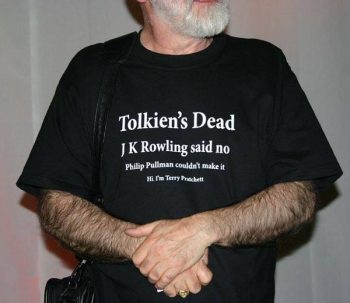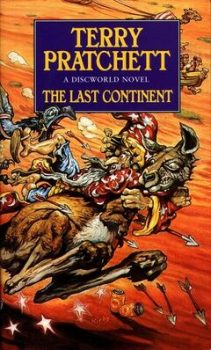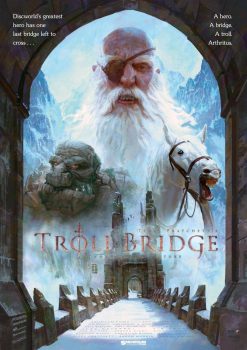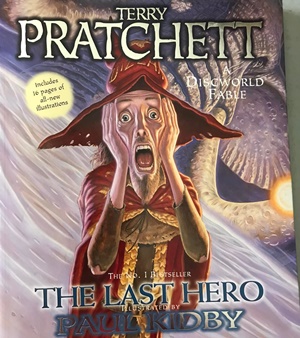Terry Pratchett – A Modern-Day Fantasy Voltaire
 March marked my tenth year of blogging here at Black Gate! Here was my very first post, on March 10, 2014. I’ve taken a few breaks, but I have posted almost every Monday morning for a decade! And today is my birthday – pretty neat posting day for me.
March marked my tenth year of blogging here at Black Gate! Here was my very first post, on March 10, 2014. I’ve taken a few breaks, but I have posted almost every Monday morning for a decade! And today is my birthday – pretty neat posting day for me.
Next week, my Doyle on Holmes series starts up and carries us through April and into early May. Had to fill in today with something. I finished up my re-read of the last ten books in Glen Cook’s Garrett, PI, series, and I have a post coming on that soon.
Still in ‘that kind of mood,’ I decided I needed a little Pratchett. We’ve got quite a few Terry Pratchett fans here at Black Gate, and you can find links to various posts on them, below. Since it’s been almost two years since I wrote about Pratchett, it’s high time I added a new essay.
I don’t have any interest in Tiffany Aching, and haven’t read those books. For me, they’re not really Discworld books. To each their own: they’re just not for me. Working from there, I have read everything but Raising Steam. I’ve set that aside, as Snuff was just okay, and Unseen Academicals was the first Discworld book I actually thought was bad. (I believe that his Alzheimer’s was so bad, that someone else – perhaps his daughter – wrote it from his notes. It’s the most un-Pratchett quality book of his I’ve read. Folks get offended by this. It’s how I feel. Disagree with me and move on. It’s fine.)
 I often go back to the City Watch for a re-read, as it’s my favorite sub-series. But I was in the mood for some Rincewind. I decided to revisit The Last Continent. I tore through it in a couple days, and decided to follow up with another ‘Stranger in a Strange Land’ book, Interesting Times. I also discovered last week, that my Spotify Premium has 15 hours a month (and a boatload of Discworld audiobooks) included for free. So, I listened to Men At Arms, as well.
I often go back to the City Watch for a re-read, as it’s my favorite sub-series. But I was in the mood for some Rincewind. I decided to revisit The Last Continent. I tore through it in a couple days, and decided to follow up with another ‘Stranger in a Strange Land’ book, Interesting Times. I also discovered last week, that my Spotify Premium has 15 hours a month (and a boatload of Discworld audiobooks) included for free. So, I listened to Men At Arms, as well.
I listen to the BBC radio plays of Douglas Adams’ two Dirk Gently novels, at least once monthly. I often drift off to sleep to them. Repetition never wears them out. The funny stuff is still funny. The stories remain interesting.
Same with re-reading Pratchett. I prefer some books to others, of course. But the brilliance that is Terry Pratchett never wanes. I’ve said that I consider John D. MacDonald to be a great social commentator. He was far more than a paperback or mystery writer. His stuff should be studied.
Pratchett was one of this generation’s great satirists. He used overt humor, which I think causes too many to miss his brilliance. Or disregard it. The same way ‘literary’ people dismissed Pulp fiction in the twenties and thirties.
I really enjoy the Rincewind books, which often feature the wizard faculty members of Unseen University. Rincewind is a ‘wizzard.’ It says so right on his hat. He’s also the worst wizard in all of the Discworld. Which makes you wonder how he constantly saves the day.
In The Last Continent, Rincewind has found himself shifted across time and space to what is Pratchett’s Australia. It doesn’t rain there. A magical kangaroo tells him that he has already/will save the continent. Presumably by bringing back the rain.
Rincewind is the definitive coward. He constantly shares wisdom on the virtues of always running away. Which he consistently exemplifies by doing so. In The Last Continent, he makes cheap shoes every day. He runs out of them, fleeing some threat, and makes a new pair the following day.
Pratchett gives us many reasons to laugh at him. He’ snot an imposing wizard by any definition. But in Rincewind, Pratchett gives us someone we can relate to. He’s often just trying to live in the moment (ideally the moment does not involve monsters from other dimensions trying to eat him). But the world refuses to leave him alone.
Long ago, someone described life as constantly avoiding bricks thrown at you. And there’s always another brick.
That’s stuck with me for decades, and it’s quite apt for Rincewind. “It’s no good. I hate it when people are nice to me. It means something bad is going to happen.” He’s a fatalist, for good reason.
While he tends to run away more often than we do, we understand his constant travails. And he tries to step up and do the right thing. Which inevitably backfires horribly.
The underground water supply is drying up (no rain, remember). Sheep are everywhere, and they’re thirsty. Rincewind guilts himself into digging a big hole near a tree, to get some water for some sheep. While he’s way down in the hole, some shifty dude comes along and stuffs a sheep in his backpack. RIncewind tries to convince him that he shouldn’t steal somebody’s sheep. Spooked by a voice coming ‘from nowhere,’ criticizing his actions, the guy panics and flees, leaving the backpack. Rincewind climbs out of the hole but the man is long gone. As he takes the sheep out…the city watch arrives. It’s the first time he’s seen any kind of police, and they nab him for sheep napping. Which is a hanging offense.
He could have simply kept walking on the city (where he is hoping to catch a boat and get back to Ankh-Morpork, the city he’s from. But he stopped to dig a water hole for some thirsty sheep. Then saved one of them from being taken. And now he’s in a jail cell, with his upcoming hanging the biggest public spectacle in years. Because he tried to be nice.
We don’t quite end up in mortal danger of public execution, but we can relate. And it’s just about guaranteed that when he saves the day – quite often, reluctantly – he gets no credit. His work colleagues and superiors often do nothing useful, then preen about as heroes. Who hasn’t had their own work version of that?
Rincewind isn’t Conan, or Elric, or Gandalf (I’ve met Gandalf, and you sir, are no Gandalf). But while we love reading about the great heroes (or villains), we ‘get’ Rincewind.
Unseen University faculty don’t want to teach (lectures are the teaching mechanism), and the students don’t want to learn. The University has an incredible library, including magical, and dangerous, books. The entire college process is summarized in Interesting Times:
And therefore education at the University mostly worked by the age-old method of putting a lot of young people in the vicinity of a lot of books and hoping that something would pass from one to the other, while the actual young people put themselves in the vicinity of inns and taverns for exactly the same reason.
 The satire of the British higher education system is sprinkled throughout the series, via the Unseen University.
The satire of the British higher education system is sprinkled throughout the series, via the Unseen University.
Moving Pictures pokes fun at the movie industry – and fans. Jingo is an absolutely fantastic, hilarious, satire of jingoism. It’s one of my favorites. Small Gods does religion, of course.
Cohen the Barbarian is Pratchett’s take on what an elderly Conan would have been like after a life of crushing his enemies, seeing them driven before him, and hearing the lamentations of their women.
That phrase is from a scene in the first Conan movie with Arnold Schwarzenneger (it is not from a Robert E. Howard story). Sitting around with some desert chieftains, they are talking about what is best in life. That’s Conan’s view.
Pratchett recreates the scene in the first novel, The Light Fantastic. Except when the chieftains convince Cohen to answer, he replies, “Hot water, good dentishtry and shoft lavatory paper.”
That’s an older, more mature, Cohen who has done a lot of (uncomfortable) living. His actual name is Genghiz Cohen, with Genghis Khan being as much of an influence on the character as Conan is. In fact, the whole ‘lamentations of their women’ thing is from a 1927 biography by Harold Lamb: Genghis Khan, Emperor of All Men.
Wyrd Sisters is a Granny Weatherwax (and the witches) take on Macbeth. The stand-alone Eric, is a Discworld version of Goethe’s Faust. Granny and crew are back to take on The Phantom of the Opera, in Maskerade.
Moist Von Lipwig is a con-man who lets Pratchett parody the postal system (Going Postal), the Royal Mint/banking (Making Money), and the British railway system (Raising Steam). Americans don’t really get how integral railroads were/are in the UK. I flew to London and took the trains to Scotland for an Ultimate Frisbee tournament. I get it a bit.
He lampoons the newspaper industry (The Truth), and The Fifth Elephant (a City Watch novel) includes the Scone of Stone.
Pratchett can be laugh-out-loud for me. Different books appeal to me in different moods. I’m not as crazy about Hogfather, or the Witches books, as most people are. But they are still Discworld, and good reads.

The Last Hero is a lavishly illustrated novel (it’s not actually a graphic novel) featuring Cohen, based on the classic Greek myth of Prometheus. It’s ‘different’ from most of the other books, but I really enjoy reading it. It’s an immersive experience. I wrote about it here.
And the short story “Troll Bridge’ is one of his finest works. A short film was made about it, and it’s absolutely wonderful. Both the story and the film are highly recommended to see the brilliance of Pratchett.
Reading a Discworld novel is always fun. But Pratchett wrote satire at its highest level. And he wrote about life in a way we could laugh at, but still relate to. To the crowd who looks down on the fantasy genre, THAT is literature.
Previous Black Gate essays about Pratchett:
Talking Terry Pratchett (Bob Byrne)
The City Watch (Bob Byrne)
Cohen the Barbarian (Bob Byrne)
Going Postal (Bob Byrne)
The Colour of Magic (Fletcher Vredenburgh)
This Hades Business (Steven H Silver)
Troll Bridge (Tina Jens)
Terry Pratchett: RIP (John O’Neill)
Steeleye Span and Terry Pratchett (Mark Rigney)
Hogfather (Mark Rigney)
The Color of Magic (Mark Rigney)

Bob Byrne’s ‘A (Black) Gat in the Hand’ made its Black Gate debut in 2018 and has returned every summer since.
His ‘The Public Life of Sherlock Holmes’ column ran every Monday morning at Black Gate from March, 2014 through March, 2017. And he irregularly posts on Rex Stout’s gargantuan detective in ‘Nero Wolfe’s Brownstone.’ He is a member of the Praed Street Irregulars, founded www.SolarPons.com (the only website dedicated to the ‘Sherlock Holmes of Praed Street’) and blogs about Holmes and other mystery matters at Almost Holmes.
He organized Black Gate’s award-nominated ‘Discovering Robert E. Howard’ series, as well as the award-winning ‘Hither Came Conan’ series. Which is now part of THE DEFINITIVE guide to Conan. He also organized 2023’s ‘Talking Tolkien.’
He has contributed stories to The MX Book of New Sherlock Holmes Stories – Parts III, IV, V, VI, XXI, and XXXIII.
He has written introductions for Steeger Books, and appeared in several magazines, including Black Mask, Sherlock Holmes Mystery Magazine, The Strand Magazine, and Sherlock Magazine.
I started reading Discworld material with some of the middle period novels, and perhaps as a result I’ve never been able to feel that the first two volumes, which were essentially collections of parodies, were part of the Discworld I knew. Even the third volume, Equal Rites, feels like it’s only halfway to being a Discworld book: Its Granny Weatherwax is very different from the character in the later books, and its Ankh-Morpork doesn’t feel the same either.
Of the later books, there’s one that I bought and later resold: Monstrous Regiment. It had its moments, but it really seemed to be just one joke repeated over and over and over. I liked it the first time! But even Jove nods. I haven’t bought Raising Steam yet, but I’ve read library copies, and I found it enjoyable, and a nice final salute to the technophilia that increasingly pervaded the Disc.
Happy Birthday and Congratulations on your Decade!
Mr. Pratchett and his body of work are some of the most impressive in satirical fantasy. Hands down, no qualifiers of time and space. Must say, though, it took having been away from England for many years before they were actually enjoyable, because a lot of them hit a little _too_ close to home; getting through a book is a chore while constantly thinking, “Yes, that’s exactly how it is. It’s not funny, it’s bloody frustrating!” After a little time as seasoning, “Going Postal” ended up being a good place to start. The day Pratchett left with Bill Door was a sad one for the small gods of Godville the game.
The ‘too true it hurts’ is interesting. I’m a HUGE fan of Douglas Adams’ Dirk Gently books (which I’ve written about here). I had the sense that those were similar – spot on criticisms and commentary of UK life. Did you find that?
Sort of… there’s a slight tonal difference between Adams and Pratchett, though, that makes the accuracy more (bearable? Expected? Dull-toothed?) so that the reader can just grumble rather than reliving slights. While Pratchett could write some tonally dark and disturbing stuff, it doesn’t have the edge of post-modern British cynicism/skepticism that characterizes much of Adams’ material. Pratchett offers criticism with a pat on the head, where Adams offers it with a knitting needle to the scapula. Where Pratchett leaves you simmering and mulling, Adams makes you go, “Ouch! Well, yes, I get it.” …Does that make any sense?
Discworld is an example of the dangers of blurb inflation. My expectations for the Color of Magic were sky-high because of all the breathless quotes on the paperback…and then I didn’t like it. Thank goodness I decided to give the series one more try; I loved The Light Fantastic, and I was off and running.
What I love about the Discworld books is they’re genuine fantasies, not just collections of jokes like the Robert Asprin Myth books – which are fine, but they’re not on Pratchett’s level. The Discworld books are full of moments that aren’t funny at all, but are still great – Mort listening to all the sands in all the hourglasses, all the time in all the lives, running out; Esk being so intoxicated with being a bird, and realizing that if she doesn’t change back in a few seconds, she’ll forget that she was ever human and just be a bird for the rest of her life…
Pratchett was just wonderful, and as a comic writer, he stands with P.G. Wodehouse, and I can think of no higher praise than that.
I think it’s pretty common throughout the Pratchett fan base which is both huge and dedicated), that the first two novels resonate the least. He was figuring things out, and simply wasn’t as good a writer as he would be a few books later.
I never had a problem with the first two, but I seem to be in the minority.
[…] A LAUGHING MATTER. Bob Byrne’s enjoyment is contagious in his article “Terry Pratchett – A Modern-Day Fantasy Voltaire” for Black […]
I hate to be the board game nerd, but, the game Discworld: Ankh-Morpork is a brilliant merging of a game, with the theme from Discworld. I actually bought it because I like Pratchett’s work, and I am a huge fan of the designer.
Re Pratchett’s work. I have purchased 4 copies of Good Omens and when I lend them to friends, they decide they like it so much they keep it.
I am a TOTAL board game nerd. Did you hear that Modiphius got the rights to a new Pratchett RPG? And I think they also are going to put out new board games.
I thought I saw some of the old board games may be brought back into production as well. I’ll have to dig into that a little.
Never played a Discworld board game, but I want to!
Pratchett spoke during his lifetime about how his condition affected and changed his writing process. His vision was affected such that he was no longer able to read, and he wrote his last several books by dictating them aloud to his assistant; his deteriorating vision meant he could also no longer edit drafts of his own work as he once had. This feels like enough of an explanation for the noticeable changes in style in the final books that the ghostwriter theory has always felt moot to me–but more than that, I just don’t believe Pratchett would ever have consented to putting his own name on someone else’s work, or to leaving a collaborator uncredited for the sake of the “brand.”